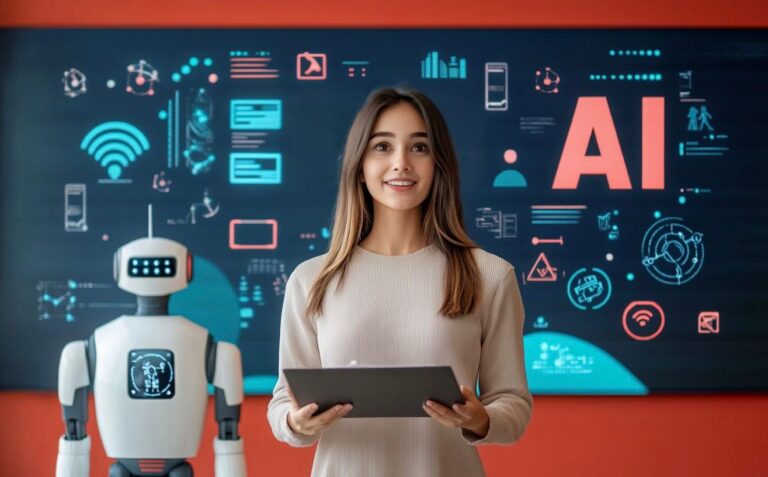The first AI software engineer has arrived. Yes, you’ve heard that right! In this blog we’ll tell you all about it and discuss how AI can assist software developers. We’ll introduce the latest tools in the field (as of the writing of this blog, things change fast these days!) and address the burning question: Can AI actually replace software developers and engineers?
Software Development: How AI is Becoming a Game Changer for Engineers
Software engineering has long been a cornerstone of the tech industry, demanding a blend of technical proficiency and problem-solving skills. Software engineering is a broad discipline that encompasses the entire software development life cycle, including requirements gathering, design, software development (the actual programming), testing, maintenance, and project management. It emphasizes the application of engineering principles, methodologies, and best practices to ensure software quality, reliability, and scalability.
Enter artificial intelligence (AI), which is shaking up entire industries and also making its mark in the field of software development. AI is a branch of computer science that aims to create intelligent machines capable of performing tasks that typically require human intelligence, such as visual perception, speech recognition, decision-making, and language translation.
Within AI, Generative AI (GenAI) refers to artificial intelligence systems that can generate new content, such as text, images, audio, or computer code, based on the training data they have been exposed to, allowing for creative and open-ended applications.
AI tools are increasingly used to automate routine coding tasks, perform thorough testing, and even predict potential problems before they become apparent. Such automation allows software engineers to focus on more complex aspects of their projects, such as architecture design and user experience enhancements. For example, AI-powered code completers can speed up the coding process, reducing the time spent on boilerplate code and debugging.
With AI’s ability to analyze vast amounts of data, engineers can gain insights into performance bottlenecks, user behavior, and system inefficiencies in real-time. This capability enables a more proactive approach to software maintenance and improvement, ensuring systems are functional and continuously optimized. As AI becomes more sophisticated, its role expands from a supportive tool to a collaborative partner in engineering teams.
In addition to enhancing traditional software development processes, GenAI provides powerful developer tools that further streamline and innovate the field. For instance, tools like GitHub Copilot utilize AI to suggest code snippets and entire functions, effectively acting as a pair programmer that reviews and writes code alongside you. Meanwhile, the OpenAI API can be integrated into development environments to enable natural language processing capabilities, assisting in everything from code documentation to troubleshooting practices. Finally, tools like ChatGPT can be employed to debug code, simulate user interactions, and manage customer support queries.
Remember, since computer code is essentially a language, then Large Language Models (LLMs) like ChatGPT or Google’s Gemini can understand it and use it. Since these models themselves are also built in these computer languages – like Python or Java – code could be the easiest language for them to perceive!
Understanding Machine Learning: The Engine Behind AI Innovation
Machine learning (ML) is a subset of AI that enables machines to improve at tasks through experience, without being explicitly programmed. Machine Learning is achieved by the human development of algorithms that can process and learn from data, making it possible for systems to make decisions, predict outcomes, and uncover insights that are often infeasible for humans to find manually.
Machine learning types include Supervised Learning, where models are trained on labeled data to predict outcomes such as spam detection or medical imaging. Unsupervised Learning involves discovering patterns in unlabeled data, used for market segmentation or fraud detection. Reinforcement Learning enables models to learn from the consequences of their actions, applicable in robotics, gaming, and recommendation systems.
Machine Learning Application in Software Development:
Machine learning is revolutionizing software development in several ways. Predictive models can be used to anticipate user behaviors, system failures, and security threats, allowing for more proactive measures. For example, ML can enhance automated testing by predicting where bugs are most likely to occur based on historical data, thus optimizing testing efforts and resource allocation.
Machine learning algorithms are transforming development tools by introducing advanced capabilities that streamline various aspects of software creation. Tools like GitHub Copilot, for instance, leverage machine learning to suggest code snippets, significantly speeding up the development process and reducing programmers’ cognitive load. In addition to code completion, ML models are crucial in enhancing software maintenance by automatically detecting and suggesting solutions for anomalies, thereby improving both efficiency and reliability. These algorithms also play a role in optimizing performance testing, refining search functionalities within codebases, and even aiding in resource allocation decisions by predicting future requirements based on past data trends.
Devin: The First Fully Autonomous AI Software Engineer
You’ve heard of numerous AI tools and probably use several in your daily tasks, but have you ever heard of an AI software engineer? Though it’s not yet commercial, we can’t help but be excited about the capabilities of this groundbreaking innovation. Let’s just say, if AI was a toolbox, Devin is the multi-tool that’s suddenly sprouted arms and gotten a degree in software engineering!
Devin is self-acclaimed as the world’s first fully autonomous AI software engineer. Crafted with advanced capabilities in long-term reasoning and planning, Devin is a full-fledged team member capable of handling complex software engineering tasks that require thousands of decisions. Equipped with the ability to recall relevant contexts and learn from past interactions, Devin dynamically adapts and improves, ensuring each project benefits from accumulated knowledge and experience.
What does this mean, and why is it so exciting for the software development community? It means that individuals with no programming experience, like product managers or business executives, can ask Devin to create software that performs a specific task, simply by describing it in plain English. Devin then acts as a human software engineer would—researching, deciding, implementing, coding, assembling, testing, and finalizing the software. Remarkably, tasks that would typically take entire work days or weeks can be completed in just minutes. It’s mind-blowing.
Watch Devin in Action: A Quick Demonstration
Devin operates in a rich, sandboxed computing environment that mimics a human engineer’s workspace, complete with common developer tools such as a shell, code editor, and browser. This setup allows Devin to execute a wide range of software development tasks autonomously, from writing and testing code to deploying fully functional applications. For instance, Devin can autonomously navigate through the use of unfamiliar technologies, applying them effectively within projects.
It actively engages with human team members by providing real-time updates, seeking feedback, and jointly making design decisions. Devin’s collaborative nature is illustrated through several groundbreaking applications. For example, after studying a blog post, Devin can use ControlNet on Modal to generate images containing concealed messages. Devin autonomously built and deployed an interactive website that simulates the Game of Life, progressively enhancing it based on user requests.
Will AI Replace Software Developers?
With the advent of AI tools like Devin and other advancements, it’s natural to question the future role of software developers. Whether you’re considering a career in software development or you’re an established programmer thinking about future-proofing your job, these concerns are valid. However, the reality is more about adaptation and enhancement rather than replacement.
AI is designed to augment the capabilities of software developers, not replace them. Most AI-powered tools like code completers, automated testers, and platforms help eliminate the tedious aspects of the programmer’s job, such as dealing with boilerplate code or performing routine diagnostics. This shift allows developers to focus on more creative and complex problem-solving aspects of software development, potentially making the job more fulfilling and dynamic. Working alongside AI offers a unique opportunity for software engineers to learn from these advanced systems, gaining insights into new efficiencies and problem-solving approaches that could redefine their roles for the better.
At the same time, advanced tools like Devin demonstrate how AI can evolve from a narrow AI, capable of performing specific tasks, to a general AI, closer to human intelligence and able to perform a wide range of tasks, make decisions, and adapt to unexpected scenarios. As AI advances, it may eventually take on more programming and engineering tasks that are currently reserved for humans.
For those entering the field or currently working in it, developing an understanding of AI and machine learning can be a significant asset. Learning to collaborate with AI tools and platforms are a key component of future software development processes. Being able to develop AI models and applications is where the highest demand for human software developers lies, and where the salaries are also the highest.
Wawiwa’s Reskilling and Upskilling Programs
Wawiwa is a global tech education provider offering reskilling and upskilling programs to various tech and business jobs. Wawiwa reskills people with no background in programming to sought-after jobs as Frontend Developers, Full-Stack Developers, and other tech professions.
Wawiwa’s Frontend and Full-Stack Developer Programs give students the skills and tools to become job-ready in just 9 months. Both programs integrate the use of advanced AI tools in the training process to simulate real-world software development scenarios, preparing graduates to excel in the tech industry upon completion.
In addition to reskilling programs, Wawiwa also offers targeted AI upskilling courses designed for programmers looking to enhance their expertise.
- Machine Learning for Programmers is an intensive 40-hour course that equips software developers with the skills needed to implement machine learning algorithms and solutions effectively.
- Meanwhile, our Practical Machine Learning with Python seminar provides a concise, 8-hour dive into using Python for practical machine learning applications.
Both courses are structured to provide hands-on experience, ensuring that participants understand the theoretical underpinnings of machine learning and gain the practical skills necessary to apply these techniques in their projects.
Conclusion
The role of software developers and engineers is evolving quickly. AI tools like Devin automate routine tasks and expand to perform broader and more complex areas of software engineering. By embracing these changes and continuously learning from AI, software engineers can ensure they remain indispensable, at least for a while, turning potential challenges into opportunities for growth and advancement. The future of software development is destined to be a collaborative effort between humans and AI, driving innovation forward, together.



